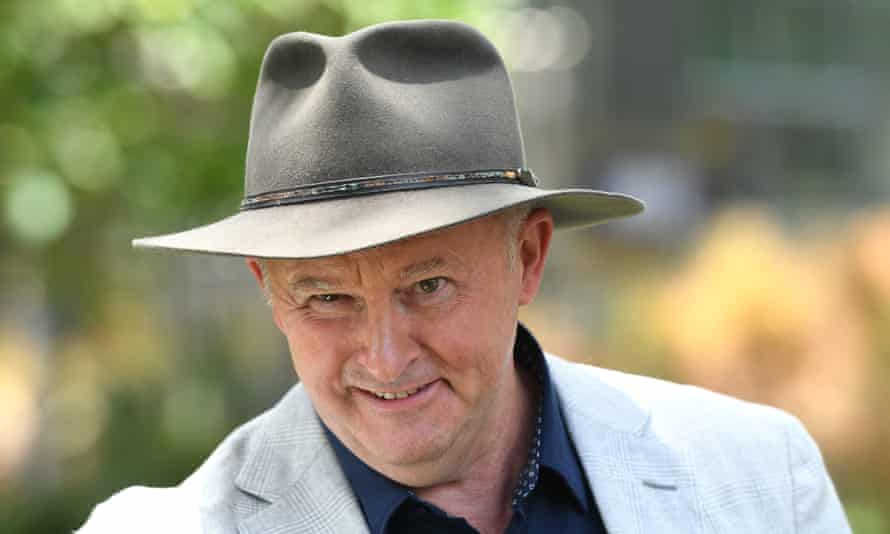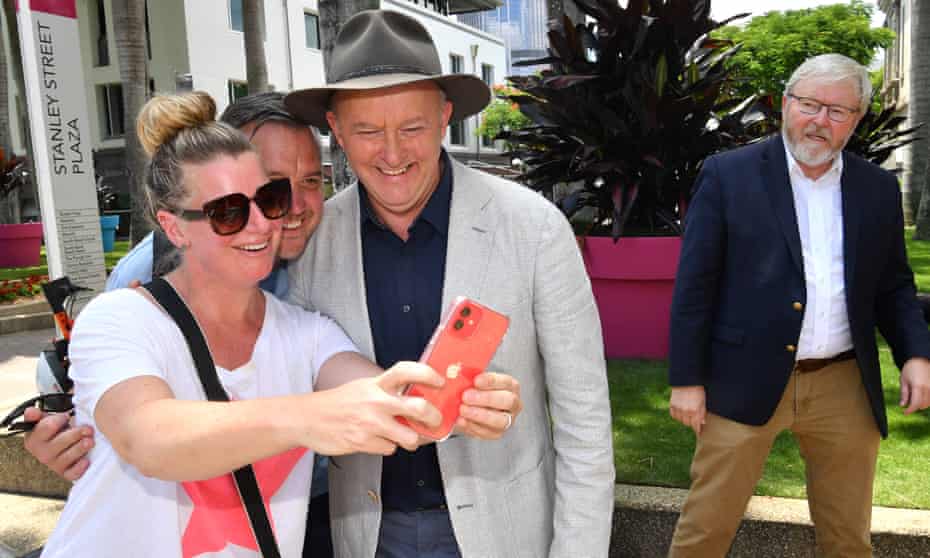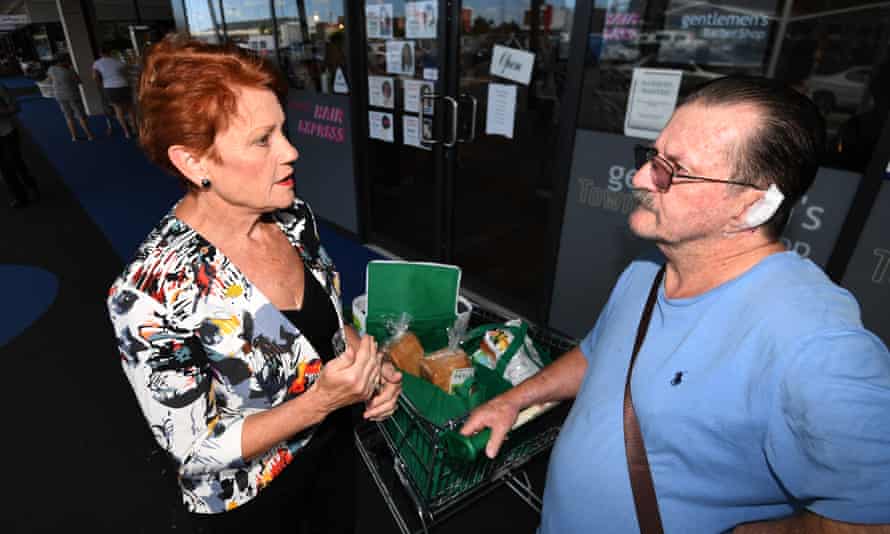Extract from The Guardian
Labor strategists say the party’s plan to win back the sunshine state is one of the most crucial in years.

Last modified on Sat 13 Feb 2021 06.02 AEDT
“I’ll know my song well before I start singing it,” Bob Dylan wrote in 1963.
When it comes to Queensland, federal Labor is still working on its song. But the party is hopeful Anthony Albanese and the party machine at least have a tune.
Albanese’s sortie north had been in the works for more than a year, but the pandemic played havoc with everybody’s plans. The Labor leader then planned to use the summer to make up for lost time campaigning in Queensland, Western Australia and northern Tasmania, but his car crash derailed things again.
Albanese finally hit the road in Queensland this week. The visit is the first step in the party’s bid to win back a state that conclusively turned its back on federal Labor just 637 days ago, helping to deliver Scott Morrison his “miracle” win, and leaving the ALP shellshocked and pointing fingers.
The Labor leader’s message was clear.
“We are here talking about good jobs, secure jobs, good pay, pay increases. People know that they’re struggling to keep up with the cost of living,” he said on Thursday.
“They know that this government is an arrogant government that has taken Queenslanders for granted.”
The Guardian spoke to at least a dozen Labor strategists and campaigners about the party’s plan to win back Queensland in what is shaping up as one of the opposition’s most crucial in years. All spoke on the condition of anonymity, as none have permission to speak on behalf of the party when it comes to campaigning.
But the backroom all paint the same picture: 2021 is not about hubristic aims of winning Queensland, but winning back trust.
Variations of “we’ve learnt the lessons from the last election” and “it’s about practical solutions, not answering questions people haven’t asked” came up time and time again.
Labor’s 2019 policy platform mea culpa and plans for a smaller, more targeted offering at the coming election are well documented and have formed the basis of the new slogan “on your side”, a phrase being increasingly used by MPs in daily communications.
“Today I have a clear message – Labor is on your side,” Albanese said more than once during the week.
It’s a message aimed at the nation, but in particular Queensland, where an apparent collapse in the Pauline Hanson protest vote has Labor smelling an opportunity.
‘Queensland is probably the hardest task’
Research across the last year has revealed who the party needs to win back to have a shot at the next election – working women, young people and those lacking in skills – and Queensland is the electoral canary in the coalmine for all three.
The key targets in an election that could be held later this year are Leichhardt in the state’s far north, and Flynn in central Queensland.
Both are held by long term LNP MPs who are expected to retire before the next election – Warren Entsch and Ken O’Dowd. Two of the four seats Labor won from the LNP in its 2020 state election victory were where the incumbent LNP MP was retiring. Labor is betting it has a better chance in areas where the local MP’s personal following won’t count for much.
Longman, lost at the last election, is another hope, as is the inner-city seat of Brisbane, and the Gold Coast seat of Forde. Both Forde and Longman meet Labor’s outer suburban challenge, although neither has been considered a comfortable Labor seat.
“No one is saying we have given up on Queensland, or that we don’t hope to make some pretty big gains there,” a party strategist says.
“We have pretty much hit the limit of where we can go in NSW and Victoria, and so we need Queensland, northern Tassie and Western Australia. Queensland is probably the hardest task. We didn’t just go backwards, we almost went inside out. So we need to get back to an equilibrium and let people know that we are on their side. It’s a big challenge, but we have been working on it since the election loss.
“Just because the federal press gallery isn’t aware of every move, doesn’t mean we aren’t making them.”
Albanese’s weeklong Queensland trip was solely aimed at local media.
Local media was the focus for the entire week, with only Albanese’s Wednesday speech on IR gaining national attention.
The trip also served as an attempt to convince star local candidates to put their hand up for preselection.
Popular local councillors and mayors are being courted, with Albanese and the party keen to repeat the path to victory Kristy McBain forged in Eden-Monaro.
Top of the wishlist is Matt Burnett, the mayor of Gladstone regional council, which sits partly within O’Dowd’s electorate of Flynn.
Burnett has held the mayoralty since 2016, increased his popular vote at the 2020 Queensland council elections, and is considered to have the local appeal and knowledge to wrestle the seat back if O’Dowd retires, as expected.
The former Palaszczuk government minister and Campbell Newman slayer Kate Jones is being wooed to run against Trevor Evans in Brisbane. Jones, who retired from state politics to spend more time with her children, is unlikely to run, but is considered the best chance of providing Evans with a challenge.
Labor operatives have also been speaking to the former deputy premier Jackie Trad as a potential Senate starter, seeing her as the Queensland’s left faction version of Kristina Keneally.
Overwhelmingly though, the missive from party HQ has been to focus on popular and entrenched locals rather than names, with the party hoping to rebuild trust electorate by electorate, building from the community up.
Condensing climate change
Still, the question keeps being asked: has Labor learned its lesson from its 2019 result, particularly in Queensland?
Then, climate policy proved the biggest stumbling block, with Labor accused of sending one message to Melbourne and another to Mackay.
The party doesn’t have all the answers on its climate policy, even now. But it has condensed its message to one it hopes will not traverse the wars of the last election.
“Climate change is happening and people are smart enough to know that. We’re not going to be telling people differently,” a Labor campaign staffer said.
“What we will be doing is saying, ‘yes it is happening, but while there is coal demand, we will still supply it. We’re not shutting your industry down. But what we are doing, is looking at what jobs you can have once it’s over. And if you look at your government MPs, your Matt Canavans and George Christensens and Keith Pitts, they’re telling you you don’t have to worry, that this is it forever.
“Well, we know it’s not. Everyone knows it’s not. We can plan for what comes next while standing in support of what is there now.”
It’s about showing people we are economically responsible at the same time as environmentally responsible
Labor is still to decide on a 2030 emissions target, or the mechanism to reach it, decisions not expected to be known until after the Glasgow climate conference in November. The Queensland contingent is very keen for Labor to prepare those answers well in advance.
One hope is that the independent push in the southern states, crystallised by the electoral success of Helen Haines, Zali Steggall and Rebehka Sharkie, could reach Queensland and help take some of the climate policy heat. Any move towards independent candidates running single issue platforms, has been slow in Queensland, but there is precedent in the state campaigns.
“Obviously we would want to win, but having another candidate speaking the same language isn’t a bad thing,” a Labor adviser said.
“It’s not something we have control over, but it’s something some of us are keeping an eye on. It’s good to see our messages diversified.”
At the 2019 election, the inability to explain policies, or apply them to people’s real world situations, turned voters away. The new strategy has so far been narrowed down to one message: campaign on practical messages which will make a difference to people’s lives.
Or, as Queensland Council of Unions president, John Battams put it, keep it realistic, and real.
“It’s about showing people we are economically responsible at the same time as environmentally responsible, and showing you can grow jobs by focusing on both.”
One Nation votes up for grabs
It is not just voters who listened to the government message that Labor needs to win back. When the dust settled on the 2019 result, the Coalition’s vote in Queensland had increased by just 0.5%.
The 4.23% negative swing against Labor mostly landed with Pauline Hanson.
The most recent state election result points to One Nation’s vote having collapsed since the May 2019 election, leaving federal Labor hopeful it can win back voters seduced by Hanson’s message, but disappointed by her actions.
At the last federal election Hanson’s party increased its vote by 3.3%, giving it 8.7% of the vote across the state.
At last year’s state election, following what was labelled a “low energy” campaign with minimal appearances from Hanson, the party’s statewide vote fell 6.6% from the 2017 state election to just 7.12%.
The Greens, despite winning a second seat, had a 0.5% swing against them.
Hanson is expected to campaign harder in the coming election, given it is her own Senate seat at risk. But her position during the pandemic, calling for borders to be open, turned off voters, and the damage is yet to be repaired.
Clive Palmer’s attempt to run a scare campaign against Labor in last year’s state election barely made a ripple, despite the ubiquitous $5m advertising spree.
While the power of incumbency during the pandemic has not been underestimated in the state election win, Labor is hoping that some of the feeling will transfer.
“We’re not stupid enough to think that people who voted for us in the state election will suddenly vote for us in the federal election too,” a Labor MP said. “We’re not the government, federally, and it’s been proven that Queenslanders can separate state and federal desires.
“But looking at the state election, we made ground in areas we really messed up in the 2019 election – central and north Queensland. And that suggests that there has been some brand recovery, and there is hope there to at least get people listening to us again.
“And you never know with politics. One big stuff up by Scott Morrison is all it would take to turn some of that tide. People didn’t vote for the Coalition in Queensland, they voted against Labor.
“We just have to get the message right, and I think we are getting the bones of it and we’re on the right track.
“And then, we just have to sing it from the rooftops.”
No comments:
Post a Comment